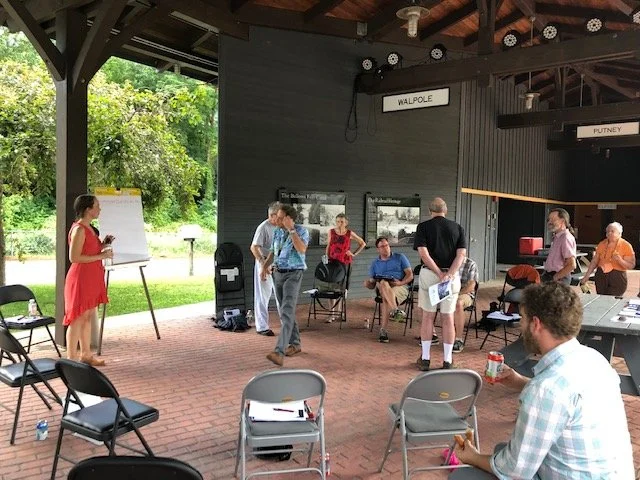IncDev Community Spotlight: Jeff and John Dunbar
“We think of ourselves as farmers. Let’s only invest where we sleep.”
Jeff and John Dunbar are part of a growing movement of incremental developers building community and working to shape where they live.
Having returned to their hometown of Rockingham, Vermont after years of being away, the brothers were interested in reinvestment. “We saw the decline, and that not a lot was changing,” says Jeff. “We decided if we were going to live here, we were going to invest our energy and resources.”
In 2020, Jeff attended his first IncDev workshop, and it inspired the Dunbars to take up their first project. They’d acquired a few rental properties from their parents, and one had a deteriorating cottage attached to it. Instead of demolishing it—which would have had its own costs—they decided to rehab it. “It was going to cost $40,000 just to tear it down,” Jeff says. “That money would’ve been gone—and it wouldn’t have added anything to the community.”
Working with an architect, the Dunbars converted the building into a small, one-bedroom apartment with a loft.
In late 2020, IncDev came to Rockingham to a deep-dive on promoting small-scale development in the town. The Dunbars and other locals were so motivated by the results that they chose to keep the momentum going, founding RIDWG, the Rockingham Incremental Development Working Group, in 2021.
The group brought together residents, bankers, municipal staff, shopkeepers, and others who would gather to talk about how to implement small-scale development in town.
“We asked: What’s something we can do that people will see and feel?” Jeff says.
The answer was education. They began incorporating walkability and small-scale development presentations into existing village meetings—reaching decision-makers where they were already gathered. They covered topics like tax revenue per acre, the value of mixed use, and the benefits of “missing middle” housing.
John, who serves on the Planning Commission, saw firsthand how these conversations could shift local policy. During a zoning rewrite, the town considered increasing lot size requirements for multifamily buildings—effectively disincentivizing them. But IncDev’s earlier market study in Rockingham showed that most lots were already undersized, and that the market demand told a different story.
“People’s perception didn’t match the reality on the ground,” John said. “The timing of the IncDev study couldn’t have been better.”
Their work and advocacy in Rockingham soon caught others’ attention: When Jeff ran for village trustee, an older property owner approached the Dunbars and said he was impressed with how they were approaching development. He offered to sell them one of his properties—a three-story, six-unit building plus a single-family home. “He saw that we had the energy, the desire to give back to the community,” John says.
“We think of ourselves as farmers,” Jeff adds. “Let’s only invest where we sleep.”
Recently, they purchased a duplex with an adjacent vacant lot. Thanks to the 2023 HOME Act, a statewide housing reform in Vermont allowing four units by right in areas with town water and sewer, the Dunbars are now able to build without seeking a variance—a welcome change that significantly reduces the friction of small-scale development.
Thinking back to that first IncDev workshop, “It opened my eyes to development being anything that advances your community in a positive way,” Jeff recalls. “It didn’t have to be anything large—or development with a capital ‘D.’” It could be a parklet, flowers, just beautifying a neighborhood.
Asked about their advice for anyone looking to become an incremental developer in their community, the Dunbars recommended finding a partner. “Do it with someone!” Jeff says. “The hardest part was making the decision to do it,” John adds. “Yes, there are times you’re working on weekends, but it’s also fun.”
About the Developers: John and Jeff Dunbar grew up in Bellows Falls, Vermont and have spent most of their 50+ years in the region. They work in the housing sector through insulation and weatherization, and serve in local government and nonprofit roles. In 2014, they began as housing providers by taking over three family duplexes, then expanded their rental portfolio while serving in local government starting in 2020. Their focus is investing only in their hometown to improve homes and living conditions while changing the narrative around landlord-tenant relations.
Written by: Noah Harper. Noah Harper, AICP, is a city planner focused on housing, transportation, and equitable development. He currently works at MassDOT as a regional transportation planner, and writes about urbanism on Substack at Power and Place.






